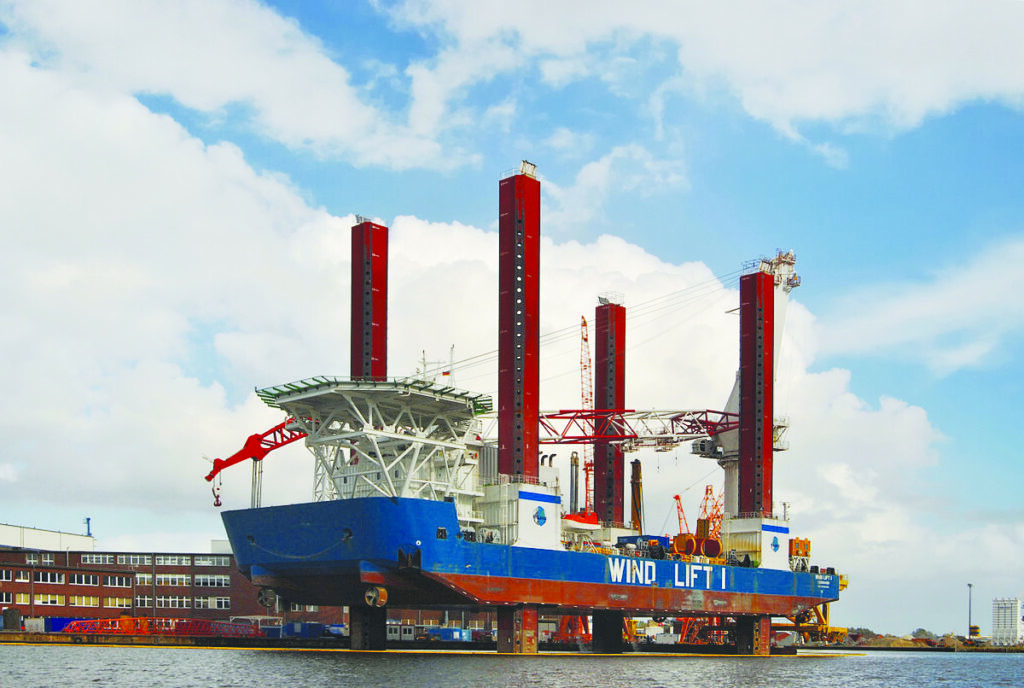
Wind Lift I, a jack-up ship for installing offshore wind turbines. Photo by kaʁstn, Wikimedia Commons https://bit.ly/30TU3v8.
George Harvey
The German Institute for Economic Research, usually called the DIW Berlin from its name in German, is a non-profit economic research institution funded by the country’s federal government. In early July, it published a report, “European Green Deal: Using Ambitious Climate Targets and Renewable Energy to Climb Out of the Economic Crisis,” which argues that the changeover to renewables had to move much faster than it is to achieve a net-zero economy in Europe by 2050.
Two goals of special importance are mentioned to show how much the changeover needs to be sped up. The first is that the European Union (EU) needs to change its renewable energy target for 2030 from 40% to 65%. The second is that it must set a target of achieving 100% renewable energy by 2040.
A reader might wonder why it could be necessary to have 100% renewable energy in 2040, if they are to have net-zero emissions by 2050. The answer is that direct uses of energy, including electric generation, heating, and transportation, are not the only sources of emissions. Others that are important include emissions from industry, land use, and agriculture. If we are to use steel and eat meat, we need to have some way to draw down the emissions associated with those things.
The report looks at the most effective solutions, based on available time and resources. It recommends that the EU move away from nuclear reactors, because they take a long time to build and are not economically as effective for dealing with climate change as renewables and storage.
The DIW Berlin report does address the cost and difficulty of getting to the goals it recommends. It shows that the EU can achieve the goals, as can each country within it. Two countries in particular are mentioned as illustrations. France gets about three quarters of its electricity from nuclear reactors, and they will eventually have to be taken offline. Poland is heavily dependent on coal, and its coal plants will have to be shut down. The report shows that both of these countries can achieve the goals it recommends.
Paying for the changeover will not be easy, but it will also not be all that difficult. Report calculations are that it will cost about €3,000 billion ($3,530 billion), a figure that is not all that far from the amount used to address the COVID-19 pandemic. On the other hand, the switch to renewable energy would save the cost of the fuels it replaces, which is calculated at about €2,000 billion.
A switch to renewable energy and storage would have effects aside from pollution, climate change, and costs. It will make the EU more energy secure, and have positive effects on the economies.
One of the authors made an interesting observation. Bearing in mind that Germany is to have the Presidency of the Council of the European Council for the next six months, Christian von Hirschhausen, the research director of International Infrastructure, Policy and Industrial Economics at DIW Berlin, said, “The German EU Council Presidency could kill two birds with one stone: economic recovery and climate change mitigation. To that end, they must ensure that the expansive economic packages that were implemented in response to the coronavirus pandemic are used for investments in renewable energy and energy efficiency in the context of the European Green Deal.”
The EU can achieve its climate goals with actions that also address the pandemic. It is a comforting thought.
What may be more comforting to us, is that we can do the same.








Leave a Reply